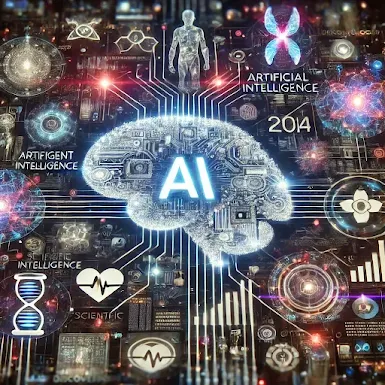The year 2024 witnessed significant developments in smart technologies, with these intelligent systems contributing to noteworthy innovations across various fields, from scientific research to everyday life. Artificial Intelligence has become an integral part of our operations, revolutionizing how tasks are executed and decisions are made.
Smart Technologies Win Nobel Prizes in Physics and Chemistry
In an unprecedented achievement, smart software won the Nobel Prizes in Physics and Chemistry in 2024. These accomplishments came as a result of advanced machine learning algorithms that helped scientists solve complex equations and discover new materials through simulation techniques.
For example, neural deep learning was used to identify the chemical properties of superconducting materials, paving the way for new advancements in the tech industry. This achievement highlights the increasing influence of intelligent technologies in accelerating scientific innovation and developing solutions that once took years to achieve.
Smart Applications in Healthcare
Artificial intelligence has revolutionized the healthcare sector, with applications in areas such as disease detection, improving surgical accuracy, and speeding up drug research and development.
For instance, AI technologies have provided accurate cancer diagnosis using medical imaging, surpassing human experts in some cases.
Moreover, smart applications now assist doctors in designing personalized treatment plans for patients based on their health data, improving recovery rates and reducing medical errors.
Artistic Innovation and Technological Creativity
The impact of artificial intelligence has not been limited to scientific fields; it has also extended to digital arts. In 2024, AI systems like "DALL-E" and "MidJourney" produced stunning artworks and music that amazed the world.
For example, an art exhibition was entirely dedicated to digital creations made by artificial intelligence, sparking questions about the future of human creativity. Can machines become artists? While this debate is ongoing, it shows that intelligent systems are no longer just tools but genuine partners in creativity.
Future Challenges Associated with AI
Despite the significant achievements, concerns have arisen regarding the impact of smart technologies on job opportunities and personal data protection. Experts predict that increasing reliance on automation may reduce traditional job opportunities, necessitating workforce retraining to keep up with these changes.
Additionally, concerns have grown about AI being used to violate privacy due to the widespread use of AI in data collection without explicit consent, highlighting the need for personal data protection and individual rights.
Looking Ahead at Artificial Intelligence
As we approach 2025, experts predict that the rapid evolution of smart technologies will continue. AI innovations are expected to expand, requiring collective efforts to establish regulatory frameworks that ensure the ethical use of these technologies.
It is certain that artificial intelligence will remain a key element in improving our lives, but there must be a focus on balancing the benefits of smart technologies with addressing the challenges associated with them, such as privacy protection and ensuring human rights.

Post a Comment